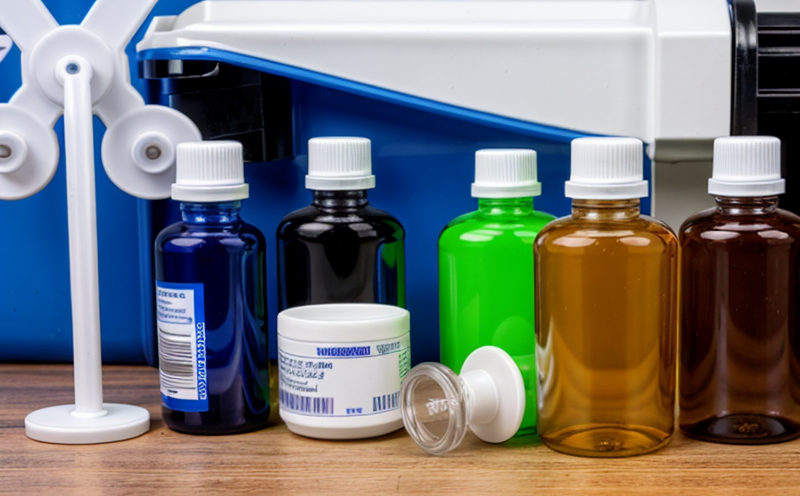ISO 10993-11 Systemic Toxicity Evaluation of Pharmaceutical Residues
The ISO 10993-11 standard is a critical component in the regulatory framework for medical devices and pharmaceuticals. It specifies requirements to evaluate the systemic toxicity potential of residues from materials used in, or incorporated into, medical devices. In the context of Medical & Pharmaceutical Waste Testing, this test evaluates whether any pharmaceutical residues present in waste could pose a risk when released into the environment.
This service is essential for ensuring compliance with international regulatory standards and preventing environmental contamination by hazardous substances. The scope includes not only the medical device industry but also encompasses pharmaceutical manufacturing, waste management facilities, and recycling industries where residual materials from drug development or production processes are involved.
The process involves several critical steps: initial identification of residues through chemical analysis, followed by in vitro studies to assess potential toxicity. These tests use standardized protocols outlined in ISO 10993-11 to simulate real-world exposure scenarios and predict adverse effects on organisms.
For pharmaceutical waste testing specifically, the focus is on identifying and quantifying active ingredients, excipients, and other components that might be present as residues after manufacturing or disposal. By conducting this evaluation early in the product lifecycle, manufacturers can mitigate risks associated with improper handling or disposal of hazardous materials.
The ultimate goal of ISO 10993-11 testing is to ensure safe practices throughout every stage from raw material sourcing to final disposal. This includes ensuring that any substances released into the environment do not exceed permissible limits set forth by environmental protection agencies worldwide.
Our laboratory uses advanced analytical techniques such as high-performance liquid chromatography (HPLC), mass spectrometry, and other cutting-edge methods to accurately measure concentrations of targeted compounds within samples. Our experienced team then interprets these results using established guidelines provided in ISO 10993-11.
Compliance with this standard helps protect both human health and the environment by minimizing potential impacts from unintended exposure to toxic substances. It also supports sustainable practices across various sectors involved in healthcare, manufacturing, and waste management operations.
By offering comprehensive ISO 10993-11 testing services, we assist clients in meeting stringent regulatory requirements while promoting responsible stewardship of resources throughout their supply chain processes.
Benefits
Conducting ISO 10993-11 systemic toxicity evaluations for pharmaceutical residues offers numerous advantages:
- Regulatory Compliance: Ensure adherence to international standards and regulations governing waste management practices.
- Risk Mitigation: Identify potential hazards early in the product lifecycle, allowing for corrective actions before they become significant issues.
- Eco-Friendly Practices: Promote sustainable manufacturing processes by minimizing environmental impact through proper waste disposal methods.
- Credibility and Reputation: Demonstrate commitment to quality and safety standards, enhancing your company's reputation among stakeholders.
In summary, implementing these tests contributes significantly towards creating safer products, protecting public health, and fostering a more environmentally responsible approach in operations.
Industry Applications
| Industry Sector | Specific Application |
|---|---|
| Pharmaceutical Manufacturing | Evaluation of residuals from drug development and production processes. |
| Medical Device Industry | Determining the toxicity potential of residues present in medical devices during disposal. |
| Recycling Facilities | Assessment of waste streams to ensure compliance with environmental protection laws and regulations. |
| Environmental Protection Agencies | Supporting regulatory enforcement by providing reliable data on potential risks from hazardous materials in the environment. |
The application of ISO 10993-11 extends beyond these sectors into any area where medical devices or pharmaceutical products are involved, including research institutions and hospitals. By ensuring that all relevant parties adhere to this standard, we can collectively work towards safer environments for everyone.
Why Choose This Test
Choosing ISO 10993-11 systemic toxicity evaluation for pharmaceutical residues offers several compelling reasons:
- Comprehensive Evaluation: Our team conducts thorough assessments that cover all aspects of potential toxicity, providing a holistic view.
- Expertise and Experience: Leveraging our extensive experience in medical device testing, we bring unparalleled expertise to each project.
- State-of-the-Art Facilities: Equipped with advanced instrumentation and analytical tools, ensuring precise measurements and accurate interpretations.
- Timely Results: Fast turnaround times allow you to receive results quickly so that informed decisions can be made promptly.
- Comprehensive Reporting: Detailed reports outline findings clearly, supporting evidence-based decision-making processes within organizations.
- Rigorous Quality Control: Strict adherence to ISO standards ensures consistent and reliable outcomes across multiple projects.
We are dedicated to providing high-quality services that meet your specific needs while maintaining the highest levels of accuracy and reliability. Contact us today to learn more about how our ISO 10993-11 testing can benefit your organization.





